Not everyone was happy about Enako revealing her riches during a year that’s been financially tough for many.
income
The world economy has taken a pretty big hit since 2007, and every country is doing what it can to recover. Some have been able to do better than others, but for most people, they haven’t gotten back to pre-crash numbers, whatever that may be.
While unemployment numbers have steadily decreased in the US, Japan has its own unique set of economic problems to deal with. With an unemployment rate sitting at 3.6 percent as of September 2014, an entirely different sort of problem is rearing its ugly head here. How can a low unemployment rate cause problems? For that answer, we have to turn to the parents.
Following on from yesterday’s compromise between dogs and cats, today let’s take a look at some of the differences between the owners of these popular pets. It’s said that dogs will stay loyal to you through thick and thin, while cats will stick up their noses at you if you so much as look at them wrong.
They each have their own special appeal, and it makes sense that there’d be some differences to be found between dog lovers and cat lovers, other than the suspicion that cat owners are slightly masochistic.
In any other country this advert where two people proudly announce: “Our total annual income is 3.55 million. We bought our mansion!” would be one of those pie-in-the-sky pipe dreams that many young professionals could only dream of.
However, in Japan this ad has left people feeling despondent about the future of the country and thinking to themselves, “I wouldn’t be smiling so much, if I were them.”
Quick, think of the one thing your parents always told you when you were growing up. Was it “be nice to people” or “always say thank you”? If the one thing you can remember getting drilled into your brain as a child was “don’t tell a lie” then chances are your making around $5,000 more annually than your peers who don’t remember such lecturing.
At least that’s what Kobe University Professor Kazuo Nishimura suggests after conducting a survey of nearly 16,000 adults in Japan.
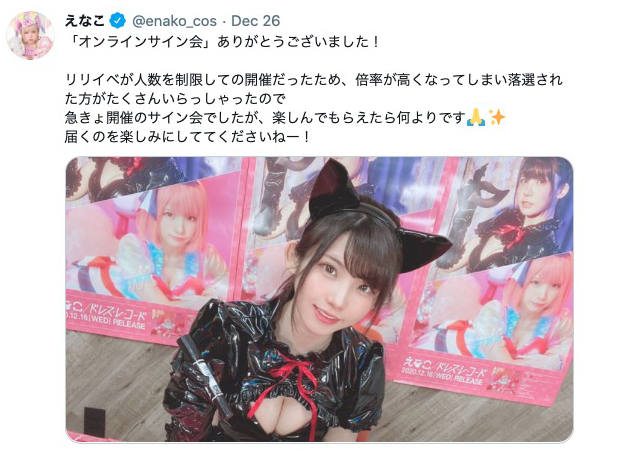
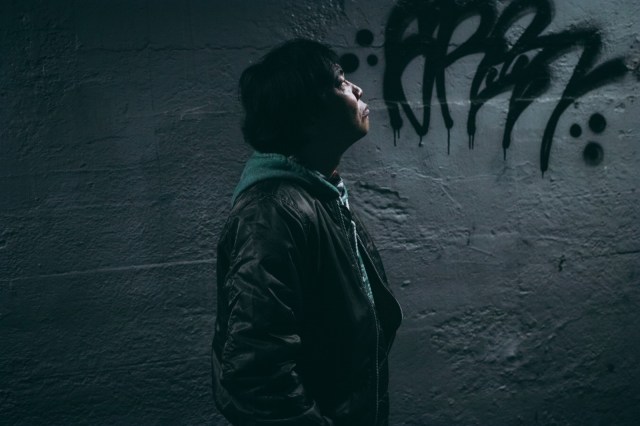
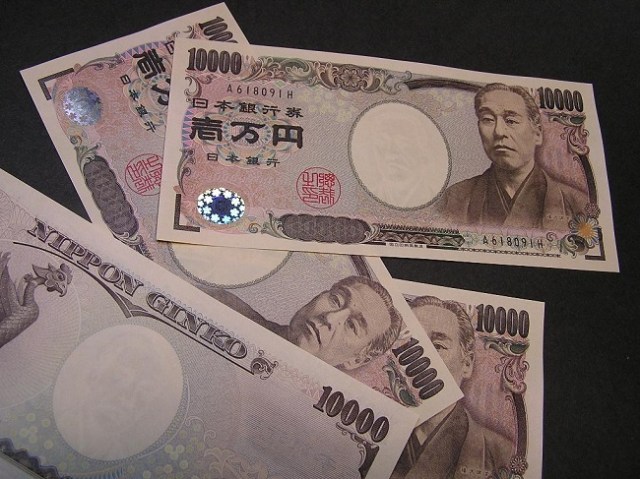
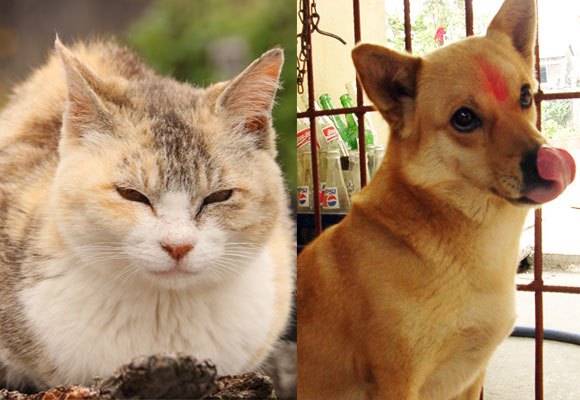
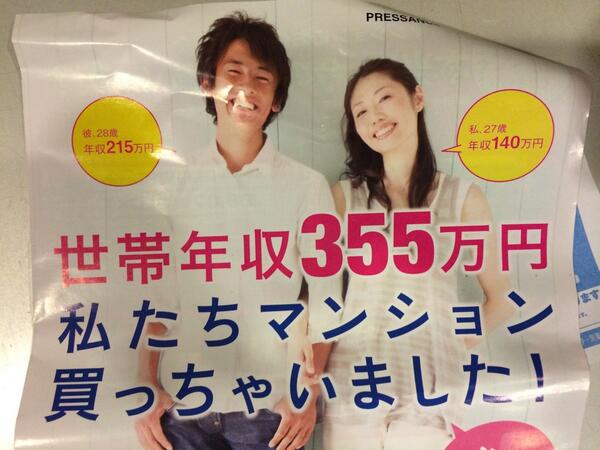
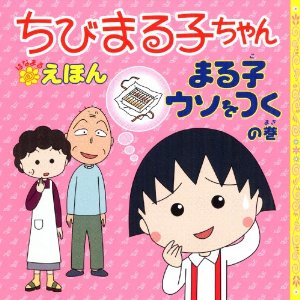
 Japan Extreme Budget Travel! A trip from Tokyo to Izumo for just 30,000 yen [Part 2]
Japan Extreme Budget Travel! A trip from Tokyo to Izumo for just 30,000 yen [Part 2] The fish in rural Fukui that rivals Japan’s most auspicious sea bream
The fish in rural Fukui that rivals Japan’s most auspicious sea bream Japan’s craziest burger chain takes menchi katsu to new extreme levels
Japan’s craziest burger chain takes menchi katsu to new extreme levels Tokyo restaurant with neighborhood grannies in the kitchen serves family recipes to one and all
Tokyo restaurant with neighborhood grannies in the kitchen serves family recipes to one and all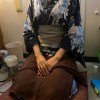 Japan’s lap-pillow ear-cleaning salons aren’t just for pervy guys, we find out
Japan’s lap-pillow ear-cleaning salons aren’t just for pervy guys, we find out Drift ice in Japan is a disappearing winter miracle you need to see now
Drift ice in Japan is a disappearing winter miracle you need to see now Japan’s top 10 open-air hot spring baths with cherry blossom views【Survey】
Japan’s top 10 open-air hot spring baths with cherry blossom views【Survey】 Tokyo street sweets: The must-snack treats of Nakano’s Refutei
Tokyo street sweets: The must-snack treats of Nakano’s Refutei Starbucks Japan releases first-ever Hinamatsuri Girls’ Day Frappuccino
Starbucks Japan releases first-ever Hinamatsuri Girls’ Day Frappuccino Saitama is home to the best strawberries in Japan that you’ve probably never even heard of
Saitama is home to the best strawberries in Japan that you’ve probably never even heard of Highest Starbucks in Japan set to open this spring in the Tokyo sky
Highest Starbucks in Japan set to open this spring in the Tokyo sky Tokyo Skytree turns pink for the cherry blossom season
Tokyo Skytree turns pink for the cherry blossom season Japanese restaurant chain serves Dragon Ball donuts and Senzu Beans this spring
Japanese restaurant chain serves Dragon Ball donuts and Senzu Beans this spring Yakuzen ramen restaurant in Tokyo is very different to a yakuza ramen restaurant
Yakuzen ramen restaurant in Tokyo is very different to a yakuza ramen restaurant Japan Extreme Budget Travel! A trip from Tokyo to Izumo for just 30,000 yen [Part 1]
Japan Extreme Budget Travel! A trip from Tokyo to Izumo for just 30,000 yen [Part 1] Japan has only one airport named after a samurai, so let’s check out Kochi Ryoma【Photos】
Japan has only one airport named after a samurai, so let’s check out Kochi Ryoma【Photos】 Japanese drugstore sells onigiri at pre-stupid era prices, but how do they compare to 7-Eleven?
Japanese drugstore sells onigiri at pre-stupid era prices, but how do they compare to 7-Eleven? Burning through cash just to throw things away tops list of headaches when moving house in Japan
Burning through cash just to throw things away tops list of headaches when moving house in Japan Starbucks Japan releases new sakura goods and drinkware for cherry blossom season 2026
Starbucks Japan releases new sakura goods and drinkware for cherry blossom season 2026 Japan’s newest Shinkansen has no seats…or passengers [Video]
Japan’s newest Shinkansen has no seats…or passengers [Video] Foreigners accounting for over 80 percent of off-course skiers needing rescue in Japan’s Hokkaido
Foreigners accounting for over 80 percent of off-course skiers needing rescue in Japan’s Hokkaido Super-salty pizza sends six kids to the hospital in Japan, linguistics blamed
Super-salty pizza sends six kids to the hospital in Japan, linguistics blamed Starbucks Japan unveils new sakura Frappuccino for cherry blossom season 2026
Starbucks Japan unveils new sakura Frappuccino for cherry blossom season 2026 Foreign tourists in Japan will get free Shinkansen tickets to promote regional tourism
Foreign tourists in Japan will get free Shinkansen tickets to promote regional tourism The 10 most annoying things foreign tourists do on Japanese trains, according to locals
The 10 most annoying things foreign tourists do on Japanese trains, according to locals Take a trip to Japan’s Dododo Land, the most irritating place on Earth
Take a trip to Japan’s Dododo Land, the most irritating place on Earth Naruto and Converse team up for new line of shinobi sneakers[Photos]
Naruto and Converse team up for new line of shinobi sneakers[Photos] Is China’s don’t-go-to-Japan warning affecting the lines at a popular Tokyo gyukatsu restaurant?
Is China’s don’t-go-to-Japan warning affecting the lines at a popular Tokyo gyukatsu restaurant? Survey asks foreign tourists what bothered them in Japan, more than half gave same answer
Survey asks foreign tourists what bothered them in Japan, more than half gave same answer Japan’s human washing machines will go on sale to general public, demos to be held in Tokyo
Japan’s human washing machines will go on sale to general public, demos to be held in Tokyo Starbucks Japan releases new drinkware and goods for Valentine’s Day
Starbucks Japan releases new drinkware and goods for Valentine’s Day We deeply regret going into this tunnel on our walk in the mountains of Japan
We deeply regret going into this tunnel on our walk in the mountains of Japan Studio Ghibli releases Kodama forest spirits from Princess Mononoke to light up your home
Studio Ghibli releases Kodama forest spirits from Princess Mononoke to light up your home Major Japanese hotel chain says reservations via overseas booking sites may not be valid
Major Japanese hotel chain says reservations via overseas booking sites may not be valid Put sesame oil in your coffee? Japanese maker says it’s the best way to start your day【Taste test】
Put sesame oil in your coffee? Japanese maker says it’s the best way to start your day【Taste test】 No more using real katana for tourism activities, Japan’s National Police Agency says
No more using real katana for tourism activities, Japan’s National Police Agency says Drift ice in Japan is a disappearing winter miracle you need to see now
Drift ice in Japan is a disappearing winter miracle you need to see now Japan’s top 10 open-air hot spring baths with cherry blossom views【Survey】
Japan’s top 10 open-air hot spring baths with cherry blossom views【Survey】 Tokyo street sweets: The must-snack treats of Nakano’s Refutei
Tokyo street sweets: The must-snack treats of Nakano’s Refutei Starbucks Japan releases first-ever Hinamatsuri Girls’ Day Frappuccino
Starbucks Japan releases first-ever Hinamatsuri Girls’ Day Frappuccino Saitama is home to the best strawberries in Japan that you’ve probably never even heard of
Saitama is home to the best strawberries in Japan that you’ve probably never even heard of Tokyo travel hack: How to enjoy a free sightseeing boat tour around Tokyo Bay
Tokyo travel hack: How to enjoy a free sightseeing boat tour around Tokyo Bay Ghibli’s Kiki’s Delivery Service returns to theaters with first-ever IMAX screenings and remaster
Ghibli’s Kiki’s Delivery Service returns to theaters with first-ever IMAX screenings and remaster Tokyo store that only sells black shirts sheds light on why it’s opening mid-pandemic
Tokyo store that only sells black shirts sheds light on why it’s opening mid-pandemic Japan cherry blossom forecast update moves up sakura dates for many parts of the country
Japan cherry blossom forecast update moves up sakura dates for many parts of the country Kyoto planning surprise late-night inspections of Airbnb-style rentals to fight overtourism
Kyoto planning surprise late-night inspections of Airbnb-style rentals to fight overtourism 20 things to buy at the Pokémon Center Mega Tokyo store
20 things to buy at the Pokémon Center Mega Tokyo store Tokyo standing peperoncino restaurant turns our writer into a master risotto chef
Tokyo standing peperoncino restaurant turns our writer into a master risotto chef